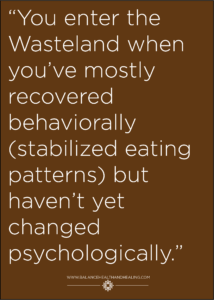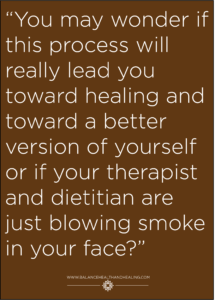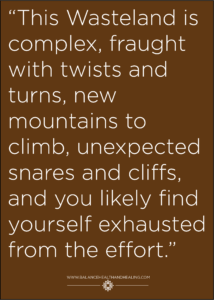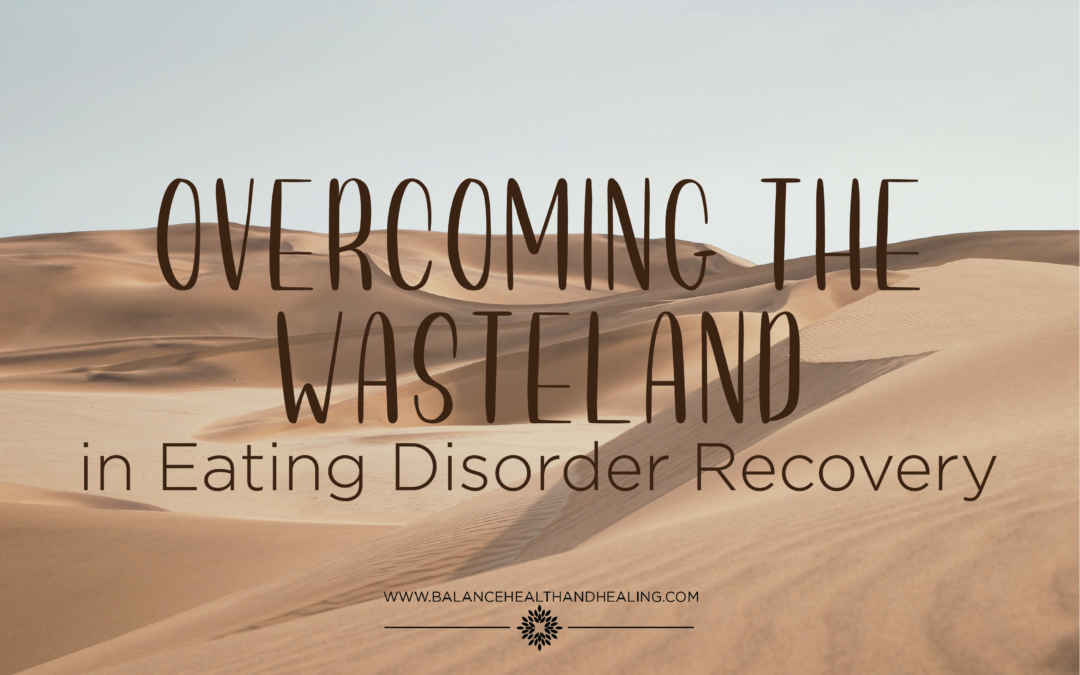Why is recovery so long and hard?
There’s a long stretch of land in treatment for eating disorders that I describe as a “wasteland.” It’s in this space where clients are most likely to relapse. Who wants to continue trekking through a wasteland without knowing when or how they will arrive in the elusive but apparently wonderous Promised Land of recovery? This Wasteland can feel like it stretches far and wide before you, indeterminately and maybe even permanently. And the trek is arduous in every way: physically, psychologically, emotionally, and spiritually.
 When someone first comes to treatment for an eating disorder, the changes can feel intense and difficult. But when people come to treatment they are coming with fresh awareness of the pain and misery of living a life with an eating disorder. Something brought them to treatment and that something gives them energy, willingness, and a hope for change.
When someone first comes to treatment for an eating disorder, the changes can feel intense and difficult. But when people come to treatment they are coming with fresh awareness of the pain and misery of living a life with an eating disorder. Something brought them to treatment and that something gives them energy, willingness, and a hope for change.
You enter the Wasteland when you’ve mostly recovered behaviorally (stabilized eating patterns) but haven’t yet changed psychologically. This is when some really difficult work starts. You may be eating more normally but you still don’t quite feel comfortable with the food your dietitian continues to ask you to consume. Maybe you feel distressed as your body’s long silent hunger cues snap back into gear and start asking for more food. You feel uncomfortable in your body and probably feel that your body image has only gotten worse since beginning treatment.
You’ve also experienced some benefits to stabilizing your food intake and re-nourishing your body. You notice you can focus better in school or at work. You notice you can track conversations more effectively and are more present with friends and family than you have been in a long while. You are sleeping better and feel more energy. And yet, the novelty and enjoyment of those improvements are decreasing as you face the onslaught of a renewed range of emotional experiences.
One of the main functions of an eating disorder for many clients is how successfully eating disorders numb painful emotions. In a physically malnourished state, one can’t feel much happiness, but there can be relief in not feeling intense negative emotions either. When a body is re-nourished, it once again has the capacity to feel and process the full range of emotions and negative emotions may show up with vengeance.
This can feel like a double-whammy in treatment because you are not only facing anxiety and distress around negative body image and resulting struggling self-esteem, but also negative emotions that haven’t been processed or treated (like anxiety, depression, or trauma).
This may bring up concerns and fears about trusting your treatment team. You may wonder if this process will really lead you toward healing and toward a better version of  yourself or if your therapist and dietitian are just blowing smoke in your face? Because it doesn’t feel like healing…yet. It feels psychologically and physically uncomfortable and painful.
yourself or if your therapist and dietitian are just blowing smoke in your face? Because it doesn’t feel like healing…yet. It feels psychologically and physically uncomfortable and painful.
And then there’s the question of identity. Depending on how long you’ve had an eating disorder before getting treatment, you may feel confused about who you are. You may have forgotten who you were before your eating disorder started. You may feel fear as you wonder, “Who will I be, if I don’t have an eating disorder?” You may worry about your ability to succeed in life, in relationships, and indeed, even wonder if you will like yourself, without your eating disorder. You feel overwhelmed with the prospect of creating a new version of yourself: a healthy version of you that shows up more completely in the world. You may not realize that you can take time in discovering yourself and developing yourself when you get distracted by the fear that you believe you need to somehow transition into someone “new” in recovery.
The Wasteland can be a difficult place for relationships too. Perhaps in the beginning of treatment there was a lot of empathy and support from family and friends for all the work you were doing. There was acknowledgement and celebration for the concrete behavioral changes you made and now you’ve been eating normally for awhile so it should be easy …right? 😉 As you continue to struggle, you may feel more lonely because you may have used your eating disorder as a way to be seen, to speak your pain and be noticed. Now this far into recovery, people may assume you are doing well because they can’t witness the invisible, emotional pain you are trudging through and you haven’t yet learned how to open up and be vulnerable with your words. Because family and friends can’t witness the emotional turmoil, they may feel frustrated or confused when they realize you still struggle. They may wonder why you aren’t better yet? They may be angry and proclaim that you are just continuing to hold onto your eating disorder and refuse to fully lean into recovery.
 Maybe there’s some truth to that. Maybe there is resistance. But it’s not the whole picture. This Wasteland is complex, fraught with twists and turns, new mountains to climb, unexpected snares and cliffs, and you likely find yourself exhausted from the effort.
Maybe there’s some truth to that. Maybe there is resistance. But it’s not the whole picture. This Wasteland is complex, fraught with twists and turns, new mountains to climb, unexpected snares and cliffs, and you likely find yourself exhausted from the effort.
In this place you hear the siren call of your eating disorder. It sings its sweet promises of relief, control, predictability. It soothes concerns about the misery you experienced with it before, telling you, “This time will be different. You’ll see.” As you listen to the alluring call, you convince yourself that you can control your eating disorder instead of it controlling you. You remember all the ways in which your eating disorder “helped” you. You believe you’ve learned a lot about yourself, and it, in this process, and somehow compromise with yourself that you won’t get as sick as before. You tell yourself that you will only have your eating disorder, just enough, to escape this insufferable Wasteland desert.
But what you don’t realize at this point, is that the oasis, off in the distance, is NOT a mirage, but is REAL. It’s not yet the Promised Land of Recovery, but it is sustaining relief, healthy nourishment, and deep love and support, that you need to keep moving on. Those Oases can be found along your route if you look for them in the form of turning to others for support, trust in your treatment team, seeking meaning, and continuing to believe in hope for yourself and a better future.
And it DOES get better. I PROMISE, it DOES. As you continue your trek and refuse to turn back to the eating disorder, you will continue to build new “muscles” (skills and experiences) that help decrease the exhaustion and build your momentum. You will begin to feel stronger, more confident, and even more hopeful. And eventually, the Wasteland, slowly and almost imperceptibly, will start turning lush, verdant, and full of life. Recovery is possible. The trek will be hard, and it can be long, but it WILL be worth it!

